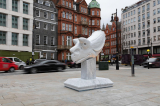
Azerbaijan's ruling elite ran a secret 2.5 billion euro ($2.9 billion) slush fund to pay off European politicians and launder money, according to an investigation by a group of European newspapers published Tuesday.
The fund operated for two years from 2012 to 2014 through bank accounts of four shell companies registered in Britain, according to the investigation by papers including The Guardian and France's Le Monde and published by the Organized Crime and Corruption Reporting Project.
Nicknamed the "Azerbaijan Laundromat", the origin of the fund is unclear "but there is ample evidence of its connection to the family of President Ilham Aliyev", the report said.
Authorities in the energy-rich country dismissed claims that the funds were linked to the first family and said the reports were "biased, unfounded and provocative".
"They are part of a campaign to smear Azerbaijan," presidential advisor Ali Hasanov told AFP, pointing the finger at arch-foe Armenia and the "global Armenian lobby."
The Guardian said some of the money went to politicians and journalists as part of a "caviar diplomacy" lobbying effort to deflect criticism at a time when the former Soviet state was being accused of arresting rights activists and journalists and of vote-rigging.
"This intensive lobbying operation was so successful that Council of Europe members voted against a 2013 report critical of Azerbaijan," the British newspaper said.
- Bank systems 'insufficient' -
Banking records leaked to Danish newspaper Berlingske which sparked the investigation show multiple payments to several former members of the Council's parliamentary assembly, The Guardian said.
The Council of Europe, Europe's top rights watchdog, said three independent experts were questioning witnesses as part of a probe into any alleged corruption.
Top Azeri official Hasanov insisted that foreign politicians, officials and experts "who have friendly feelings towards Azerbaijan" were "having suspicions cast on their activities without any basis."
One of Europe's leading banks, Denmark's Danske Bank, processed the payments via its Estonia office.
"We have previously established that, in the period leading up to 2014, our branch in Estonia had inadequate measures in place to prevent Danske Bank from being exploited for money laundering and other illegal activities," Danske Bank's chief legal counsel Flemming Pristed said in a statement issued on Tuesday.
He said the bank had terminated relationships with a number of customers and does not "in any way want to be exploited for money laundering or other illegal activities."
The lender, however, said that it "cannot comment on specific customers or specific transfers in the present matter", insisting that it is "cooperating fully with the authorities".
The four British-registered firms used in the operation have been dissolved, The Guardian said.
The authorities in oil-rich Azerbaijan have faced strong international criticism over claims they routinely harass and jail Aliyev's opponents on trumped up charges. Officials deny this.
Azerbaijan ranked 162 out of 180 countries in the 2017 World Press Freedom Index released by Reporters Without Borders.
Aliyev took over in 2003 after the death of his father Heydar Aliyev, a former KGB officer and communist-era leader who had ruled Azerbaijan with an iron fist since 1993.
Anti-corruption organisation Transparency International called for a raft of steps to help stop illegal money flows, including tightening public ownership registers and bolstering anti-laundering measures in Denmark.afp









































